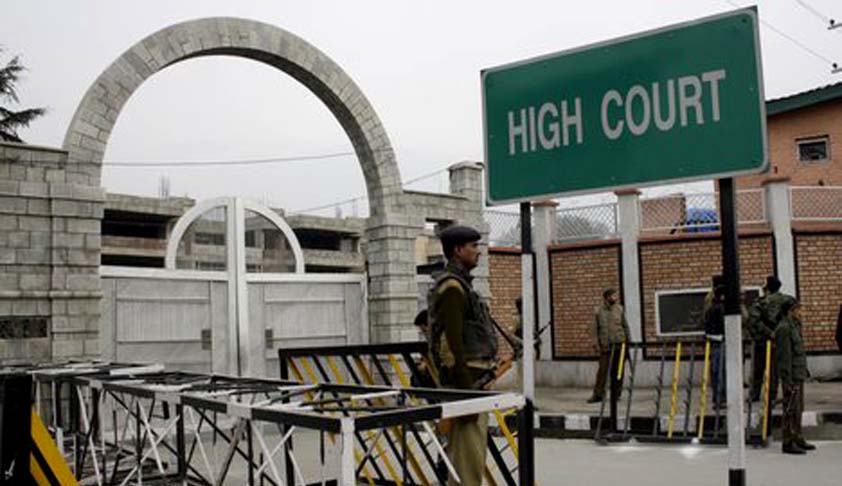Upholds detention of drug peddler under PSA
Mohinder Verma
JAMMU, Dec 31: Stating that drug trafficking leads to a constant threat to national security and sovereignty of the State by way of narco-terrorism, High Court of Jammu & Kashmir and Ladakh has held that freedoms guaranteed by the Constitutional mandate demand reasonable restrictions on the prejudicial activities of individuals who jeopardize the rightful freedoms of the rest of the society.
These observations have been made by Justice Wasim Sadiq Nargal while upholding detention under Public Safety Act (PSA) of one Akash Kharka against whom six FIRs have also been registered in different Police Stations under Narcotics Drugs and Psychotropic Substances Act (NDPSA) and different sections of Ranbir Penal Code (RPC) and Indian Penal Code (IPC).
All these FIRs have been registered against the petitioner for indulging in criminal acts and transportation of drug consignments in Udhampur district thereby creating a reign of terror among the peaceful and law abiding citizens of the area.
After hearing Senior Advocate K S Johal along with Advocate Karman Singh Johal for the petitioner and Government Advocate Sumit Bhatia for the UT of J&K, Justice Wasim Sadiq Nargal observed, “the menace of drugs is a serious threat to public health, safety and well-being of citizens at large. Even globally, the society is facing detrimental consequences of trafficking of drugs/drug abuse because it undermines the socio-economic and political stability of a nation”.
“Furthermore, drug trafficking leads to a constant threat to national security and sovereignty of the State by way of narco-terrorism. Drug trafficking along with drug abuse, especially by younger generation, has continued to take a significant toll on valuable human lives and productive years of people around the globe”, High Court said.
Justice Nargal further said, “the framers of Constitution had visualized the danger of misuse of such type of substances and, therefore, made it part of directives issued to the State. The Directive Principles of State Policy, which are part of our Constitution, lay down that the State shall make endeavours to bring about the prohibition of substances injurious for health, except for medicinal and scientific purposes”.
“Thus, it has become imperative for prohibition of such activities by preventive detention of persons engaged with the perpetration of the same in any manner”, High Court said, adding “it is apposite to mention that our Constitution undoubtedly guarantees various freedoms and personal liberty to citizens in our Republic, however, such freedoms guaranteed by the Constitutional mandate are not meant to be abused and misused so as to endanger and threaten the very foundation of our society”.
“The larger interests of our nation as a whole and the cause of preserving for every person the guaranteed freedoms demands reasonable restrictions on the prejudicial activities of individuals who jeopardize the rightful freedoms of the rest of the society”, Justice Nargal said, adding “the main object of preventive detention is the security of the State and maintenance of public order. They demand effective safeguards in the larger interest of the sustenance of peaceful and democratic way of life”.
Stating that aim of the preventive detention is not to punish a person for having done something but to intercept and prevent him from doing so, High Court said, “the law of preventive detention has direct bearing on the subjective satisfaction of the Detaining Authority. The subjective satisfaction of a Detaining Authority, whether to detain a person or not, is not open to the objective assessment by a court”.
“The court while exercising power under Article 226 is not to act as an appellate forum to scrutinize the merits of the administrative decision to detain a person. The court cannot substitute its own satisfaction for that of the authority concerned. This aspect of the matter lies in the competence of the Advisory Board”, Justice Nargal said.
Pointing towards the instant case, Justice Nargal held that detention order, which has been issued by the Detaining Authority after arriving at subjective satisfaction, does not suffer from any legal infirmity as the grounds of detention are definite, proximate and free from any ambiguity.
“Furthermore, the detenue was duly informed of what weighed with the Detaining Authority while passing the order of detention. The Detaining Authority has recorded its subjective satisfaction after considering all the material available, thus, I hold that none of the Constitutional or statutory provision has been violated”, Justice Nargal further said.
Accordingly, High Court dismissed the petition and upheld the impugned detention order.


